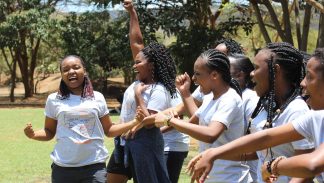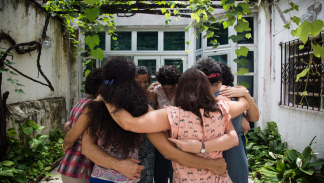Global gag rule is back: One of Trump's first actions targets the world's women
Update: May 16, 2017
On May 15, the Trump administration released its plan for expanding the global gag rule to affect nearly $8.8 billion in global health funding. This vast expansion will not only impact health clinics that offer integrated reproductive health care including abortion services, but carries massive implications for critical health needs like HIV and AIDS assistance, particularly in countries in Sub-Saharan Africa.
“This expansion of the global gag rule will mean that entire communities in dire need of health care will be left without critical services from birth control to maternal health care and HIV screenings,” says Musimbi Kanyoro, President and CEO of Global Fund for Women. “This new policy goes far beyond the issue of access to safe and legal abortion, and puts the lives of women at risk. When considered in conjunction with the administration’s funding freeze on the United Nations Population Fund (UNFPA) and the newly proposed American Health Care Act—the total picture is one of disregard for women’s health and livelihoods, not only in the U.S. but all over the world.”
While we don’t yet know the complete impact of this expansion of the rule, we do know from experience during times when the global gag rule was previously in effect—most recently from 2001-2009—that this funding cut directly impacts Global Fund for Women grantee partners around the world. Grassroots women’s groups will be forced to compete for an even smaller pool of funding for sexual and reproductive health and rights from funding sources like foundations, private donors, and other governments. In addition, momentum to change laws, decentralize services, and integrate young women’s health needs will be lost.
“The U.S. funding cuts will actually contribute to an increase in unsafe abortions, a reduction in the availability of contraceptives, and will prevent many organizations from offering life-saving HIV prevention and treatment services, maternal and child health care, and Zika virus prevention,” explains Leila Hessini, Global Fund for Women’s Head of Strategic Grantmaking and Movement Building. “The global gag rule will obstruct and destroy the work of health care providers and women’s groups who are often women’s main—and sometimes only—source for information and reproductive health services as well as primary health care.”
FEMNET (African Women’s Development and Communication Network), a longtime grantee partner based in Kenya that has been working to advance sexual and reproductive health and rights throughout Sub-Saharan Africa since 1988, is documenting the negative impact of the global gag rule in terms of shrinking civil society spaces and increased competition for diminishing funds going to comprehensive sexual and reproductive health and rights.
Global Fund for Women grantees like FEMNET have been at the forefront of efforts to resist the global gag rule and other damaging or restrictive laws around sexual and reproductive health and rights. Grassroots women’s groups are speaking up globally and have led successful movements for wins like in South Africa, which now has one of the world’s most progressive laws that recognizes women’s right to abortion, and in Nepal, where prior to liberalization, over 800 women were imprisoned for allegedly having abortions or miscarriages.
In light of the expanded global gag rule, Global Fund for Women grantee partners like Line Aborto Libre, a collective of feminists in Chile working to provide information and tools on safe abortion to women, are setting up 24-hour hotlines to ensure that women have access to safe abortion information, care, medicine, and back-up support when needed.
We will continue to monitor developments around the global gag rule implementation and impact for women around the world, and to share information about how you can help Global Fund for Women’s grantee partners resist, speak out, and fill gaps in women’s health care left by the global gag rule.
January 23, 2017
Less than 48 hours after millions of people marched for equality in cities across the U.S. and around the world—and one day after the anniversary of Roe v. Wade, the landmark 1973 Supreme Court case that guaranteed a woman’s right to have an abortion—President Donald Trump made clear that global women’s human rights are at risk.
On Monday, January 23rd, Trump reinstated the Mexico City policy, also known as the ‘global gag rule’, which bans U.S. federal funding for any international health organizations or NGOs around the world that counsel women on family planning options that include access to safe abortion. The result? Reduced resources not just for reproductive health information, but access to birth control, sex education, and HIV testing. Trump’s reinstatement of the global gag rule means that women around the world will lack access to reliable and comprehensive health care, and will not be able to make informed decisions about their health care options when pregnant.
“This is much bigger than abortion,” said Musimbi Kanyoro, President and CEO of Global Fund for Women. “The global gag rule affects family planning, maternal health, HIV prevention and services, sex education for young people—it affects the whole of women’s health care around the world. Reinstating this policy directly targets the world’s women and girls, and rolls back reproductive health and rights globally.”
This action stands to markedly decrease women’s access to reliable reproductive health care information and services, including access to contraception and STD screenings, and means that fewer women and girls globally will be fully-informed about their reproductive rights. And while Trump’s executive order was framed as a way to protect U.S. taxpayer dollars from funding abortions, the global gag rule has no effect on that; no foreign aid can currently be used to fund abortions under any circumstances under the long-standing Helms Amendment.
The global gag rule does mean that more of the world’s women will be forced to seek unsafe abortions—with potentially devastating impacts on women and girls. For example, WHO research shows that Sub-Saharan Africa had higher abortion rates after George W. Bush reinstated the global gag rule, citing reduced access to contraception causing more unwanted pregnancies. Further, studies conducted by PAI show that the global gag rule often cuts off women’s access to health care services entirely.
“The global gag rule undermines women’s health, rights, and needs,” added Leila Hessini, Global Fund for Women’s Head of Strategic Grantmaking and Movement-Building, and expert on global reproductive rights. “Organizations who receive foreign assistance are unable to counsel, refer, or advocate for abortion even if they are using funds from other sources.”
With the global gag rule reinstated, it is more important than ever to get money to grassroots, women-led groups around the world who are filling gaps in women’s health care, educating women and girls on their reproductive rights, and advocating for safe and legal abortion. This is a critical moment to get money and support to women’s movements working hard to resist rollbacks around the world.
Take action now: Donate to ensure global women’s movements can advance rights for all. Make your voice heard by signing onto our message committing to advance women’s rights.
Let’s create a chorus of global voices with #BuildMovementsNotWalls and ensure that we are heard.
Infographic: How does the Global Gag Rule affect women?
Explore our infographic to find out what you need to know about the Global Gag Rule, how it affects women’s lives around the world, and what we can do to defend women’s rights.
This new policy goes far beyond the issue of access to safe and legal abortion, and puts the lives of women at risk. When considered in conjunction with the administration’s funding freeze on the United Nations Population Fund (UNFPA) and the newly proposed American Health Care Act—the total picture is one of disregard for women’s health and livelihoods, not only in the U.S. but all over the world.”Musimbi Kanyoro


